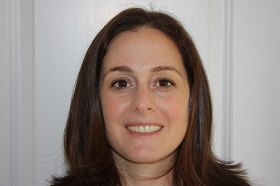Faces of COPD: Elisha Malanga says, “Let’s all work together to make a real impact on COPD.”
Posted on November 30, 2017 |
Elisha talks about her role at the Foundation and why research is essential to finding a cure. She also shares with us who inspired her early on, what motivates her now and how together we can have a real impact on this devastating disease.
Elisha feels “privileged” to be the Chief Research Officer for the COPD Foundation (COPDF), which she joined more than 10 years ago. In her current role, Elisha oversees COPDF’s research programs, working closely with “an amazing staff, patients, partners, researchers and clinicians.”
 As Elisha explains, “research is essential to finding better therapies and ultimately a cure for COPD. Working closely with patients to determine their research priorities has been enlightening and encouraging.”
As Elisha explains, “research is essential to finding better therapies and ultimately a cure for COPD. Working closely with patients to determine their research priorities has been enlightening and encouraging.”
One way that Elisha leads the charge for more research and ultimately a cure is through the COPD Patient Powered Research Network (COPD PPRN). “We have been using the COPD PPRN to recruit for studies and the response from patients has been overwhelming.” To learn more about the COPD PPRN, click here.
Elisha first learned about COPD early on in her career, more than 25 years ago, when she met John W. Walsh, Founder of the COPD Foundation and patient. And she remembers that first impression clearly to this day.
“John was incredible, a presence larger than any person I had ever met. He could motivate people like no one I had ever seen. While I miss John every day, I continue to work to fulfill COPDF’s mission and John’s vision.”
To fulfill that mission and vision, educating the general public is key. “COPD is the third-leading cause of death in the US and the only leading cause of death on the rise.”
But more funding is needed. As Elisha explains, “mortality and new therapies are directly related to research funding. COPD research is woefully underfunded compared to other leading causes of death and I hope that this will start to change so that we can make a real impact on COPD.”
There are many misconceptions about COPD and Elisha really takes this to heart. “The greatest misconception is that the patient could have or should have prevented themselves from getting COPD.”
As Elisha explains, “Many individuals with COPD either never smoked or stopped decades ago when the dangers of smoking were not known like they are today. Empowering patients is essential to finding a cure.”
On behalf of COPDF, Elisha’s main message for someone affected by COPD is this: “We care about you, we have resources for you and we are all working towards finding better therapies for you.”
Small changes can have a major impact. “There are some things you can do now, like exercise; this makes a big difference for each and every one of us all and for COPD patients it’s essential.”
Most importantly, though, “don’t give up hope,” says Elisha. “Let’s all work together to make a real impact on COPD.”